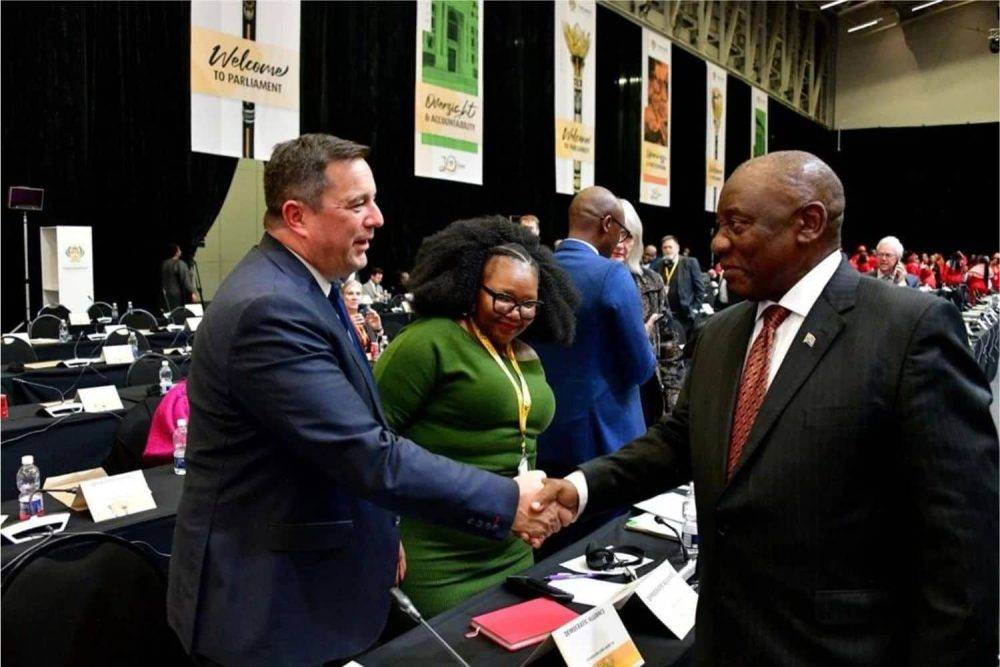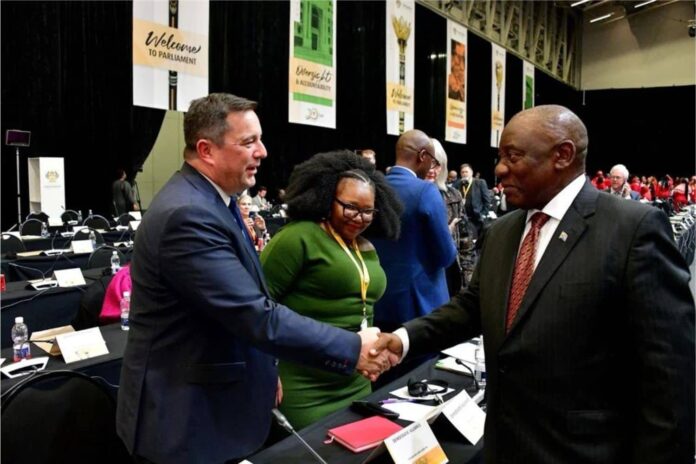
Talks between President Cyril Ramaphosa and DA leader John Steenhuisen continued throughout the day. (File photo, GCIS)
ActionSA on Tuesday attempted to come to the ANC’s rescue in make or break parliamentary deliberations on the fiscal framework, after the ANC and Democratic Alliance (DA) failed to reach an agreement.
Talks between President Cyril Ramaphosa and DA leader John Steenhuisen continued throughout the day while parliament’s standing and select committees on finance met on Finance Minister Enoch Godongwana’s revenue proposals.
DA finance spokesperson Mark Burke confirmed that the ANC has so far rejected the conditions on which his party would agree to support the minister’s 0.5 percentage point VAT increase for the coming fiscal year.
Burke tabled a proposal to amend Section 6.28 of the committee’s report on the revenue proposals to reject the tax hike and adjust the budget’s expenditure framework accordingly, minus the sum that would have been raised through higher VAT.
Burke‘s proposal won the support of the Economic Freedom Fighters (EFF), while the uMkhonto weSizwe )MK) party’s Des van Rooyen said his party would also not support a VAT increase. This signalled that the ANC’s backchannel negotiations with those two parties, to support the budget in the event that the DA and other members of the 10-party ruling coalition, failed to do so, had reached a dead end.
The Freedom Front Plus confirmed on Tuesday that it too remained opposed to the VAT increase, meaning the two members of Ramaphosa’s government of national unity were at this point not prepared to vote in support of the budget at a sitting scheduled for Wednesday.
Enter ActionSA. The party’s Alan Beesley proposed that section 2.8 be amended to defer the VAT increase and allow Godongwana and the treasury time to find an alternative way of raising the revenue to balance the budget in its current form.
Though this proposal also puts paid to the VAT increase, it offers the ANC a face-saving way of getting an amended fiscal framework approved on terms other than the DA’s — without ceding to Steenhuisen’s demands and without commitments on slashing expenditure.
“The fiscal framework tabled by the minister of finance is supported subject to the strict condition that national treasury facilitates the receipt of substitute revenue proposals, together with corresponding expenditure savings, that will form the basis of an alternative revenue proposal instead of:
a) the proposed 0.5 percentage point increase in VAT for the 2025-26 financial year, effective 1 May 2025, in respect of which the committee has expressed serious concerns; and b) the failure to adjust personal income tax brackets in line with the higher of the actual CPI inflation rate for 2024 or the projected CPI inflation rate for 2025 to prevent bracket creep.
“Furthermore, the committee recommends that the alternative revenue proposals and expenditure savings to balance the R28 billion shortfall — which must effectively suspend the proposed increases — be finalised and submitted to the national treasury to process and submit to the committee within 30 days for consideration and adoption of this report by the house.”
The ANC said it supported this proposal, but the DA, EFF, MK and other parties signalled that they would not do so when the committees vote on the report later on Tuesday.
It was not clear whether either the ANC and ActionSA or the DA and those who supported Burke’s proposal, on the other would have the numbers in the two committees to carry the day.
Either amendment, if adopted by the committee, will see the report referee back to the minister, who will have two days to comment on it.
Both are almost certain to force a postponement of Wednesday’s scheduled budget vote in the National Assembly.
But a source close to the process said there was a greater chance if Godongwana swiftly agreed to an amendment adopted by his own party. It was possible that, if this happened, parliament could in the morning publish the amended report, allowing the vote to proceed.
A simple majority is needed for adoption.
Parliamentary officials and legal advisers stressed that the legislature was in uncharted waters because it was the first time in the democratic era that there was a risk of the finance minister failing to secure approval for his budget.
By 5pm, the committees had yet to vote. They dwelled on a less contentious part of the report, plainly allowing time for further political consultations outside parliament.



